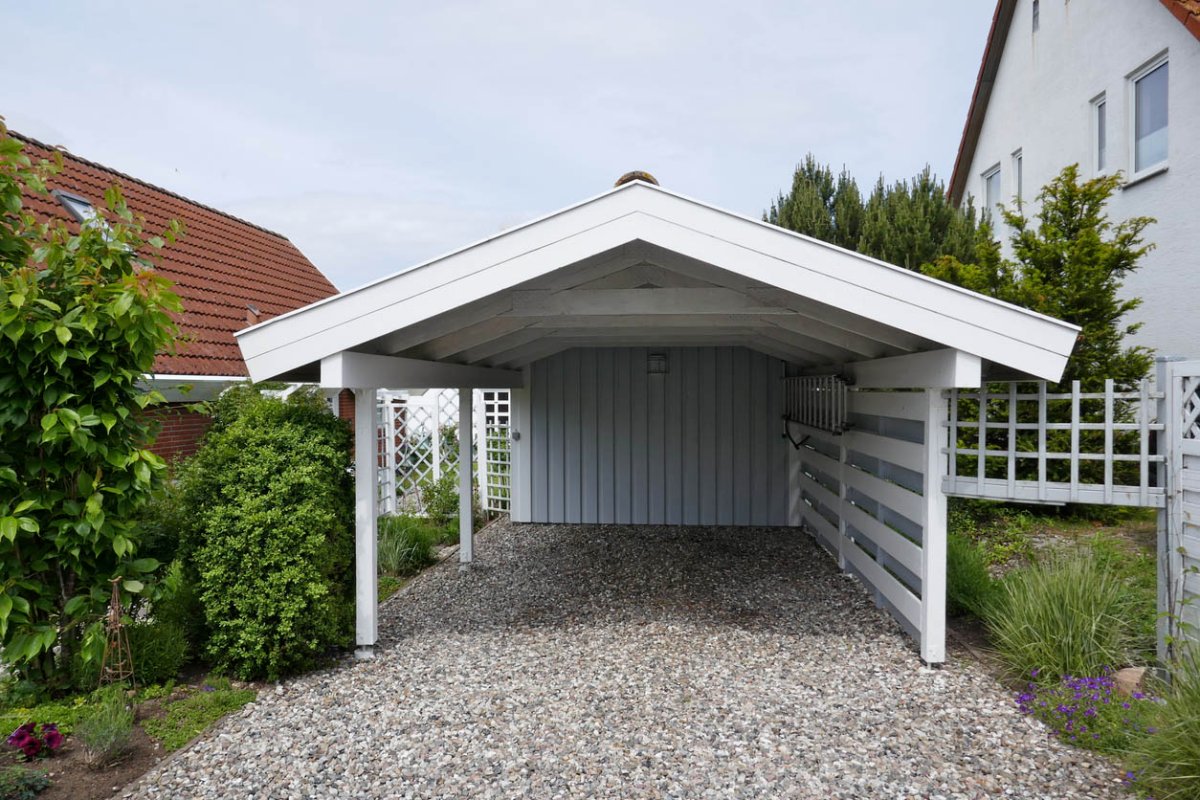We may earn revenue from the products available on this page and participate in affiliate programs. Learn More ›
- Typical Range: $3,208 to $9,882
- National Average: $6,505
Keeping cars out of the rain, wind, and snow is the ideal job for a carport. For homeowners without a garage, building a carport is the perfect solution for vehicle storage and protection. Carports can either attach to a home or be built as freestanding structures, and they can be open on all sides or closed on two or three. There is plenty of opportunity for homeowners to customize their carport to their exact style and size needs.
According to HomeAdvisor, carport cost ranges from $3,208 to $9,882, with an average cost of $6,505. There are a lot of factors that determine the cost of building a carport, including how big it is, what materials are used, and whether it is custom built or prefabricated. Additionally, if a homeowner wants to add extra features, like gutters, lighting, or even solar panels, that will increase the overall cost. This all-inclusive carport cost guide will help homeowners determine whether the carport they see for sale is a good deal or a deal breaker.
Factors in Calculating Carport Cost
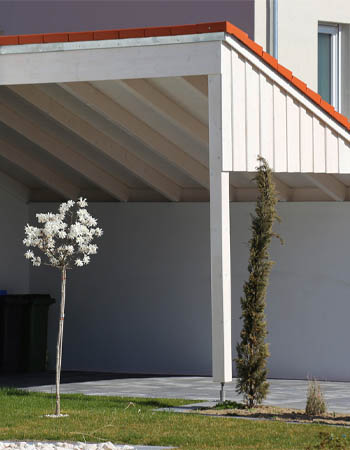
Before searching for “carports near me,” homeowners will want to consider the cost factors that affect carport pricing. Above all else, carport cost comes down to size and material type, but other elements also play a role in the cost, like anchoring and labor.
Carport Size
The size of a carport is arguably the most important factor—it is essential that homeowners make sure their car or cars will fit in the carport. The larger the carport needed, the higher the cost the homeowner will pay. A 12-foot by 20-foot carport built for one car costs $2,400 to $8,400 fully installed. A 20-foot by 20-foot carport built for two cars costs $4,000 to $14,000 fully installed. For a three- and four-car carport of 20 to 30 or 40 feet, homeowners can expect to pay $6,000 to $21,000 and $8,000 to $28,000, respectively. All of these carports are 20 feet long for a standard vehicle. If the homeowner wishes to build a carport for an RV, 30 feet is the ideal length. While a carport can be pricey, it tends to be less than the cost to build a garage for an RV, so many RV owners opt for a carport.
Carport Material
Carports can be made from polycarbonate, metal, or wood. Polycarbonate is the cheapest option at $12 to $20 per square foot. Typically, polycarbonate carports are made with aluminum framing and polycarbonate material for the top. Metal carports are a popular mid-tier option at $10 to $30 per square foot. These carports have a metal frame, made from either aluminum or steel, and a metal, polycarbonate, or fabric top. Lastly, wood carports cost between $15 and $30 per square foot. Wood carports tend to be custom built with more standard, higher-quality building materials, like shingle roofs and wood walls, and therefore are the most costly.
Carport Style
Carports can either be portable or permanent. A portable carport is less expensive, usually between $400 and $1,200, while a permanent carport costs anywhere from $2,000 to $30,000. Portable carports are temporary structures. They can come in a kit and even pop up like a tent. This style of carport is usually made with lightweight, simple materials and therefore is not recommended for long-term use. A permanent carport is built to last for many years. The materials are better quality and more durable to withstand all weather conditions. This style of carport is usually permanently attached to a concrete pad or to a building structure.
Roofing Material
The whole purpose of a carport is to put a roof over a car and protect it. There are a few different roofing materials available to use on a carport: polycarbonate, metal, or shingles. Polycarbonate is essentially a type of plastic. An installed polycarbonate roof over a carport costs anywhere from $1,000 to $9,000. Polycarbonate roofs are typically used on prefab carports. Another option is metal roofing, also used on prefab carports. The total cost of a metal roof on a carport ranges from $960 to $8,640. Finally, installing a shingle roof on a carport gives it a finished look and is reserved for custom carports. At $840 to $3,168, shingles are the cheapest carport roofing material, but they are usually paired with more expensive framing options.
Anchoring
Some carports are designed to be freestanding, while others are anchored to something. A freestanding carport costs $2,000 to $12,000 and can be set up anywhere on a property that is accessible by a vehicle. Typically, freestanding carports are simply constructed, with four support posts and a cover over the top. Alternatively, an attached carport costs $6,000 to $30,000 and is secured to another structure or a concrete foundation pad. Anchoring a carport to a building will require at least some modification to the existing structure; therefore, the cost is higher.
Labor
Labor makes up a significant portion of the cost of a carport project. On average, the labor cost for building a carport is $8 to $10 per square foot. For custom carports made from top-tier materials, the labor cost can creep up to $20 per square foot. This is the cost of the labor just to build the carport structure itself; homeowners will also need to consider the labor necessary for site prep, concrete, landscaping, and other ancillary work they’d like done. Additionally, they may need to hire an electrician to wire lighting, outlets, or an EV (electric vehicle) battery charging station.
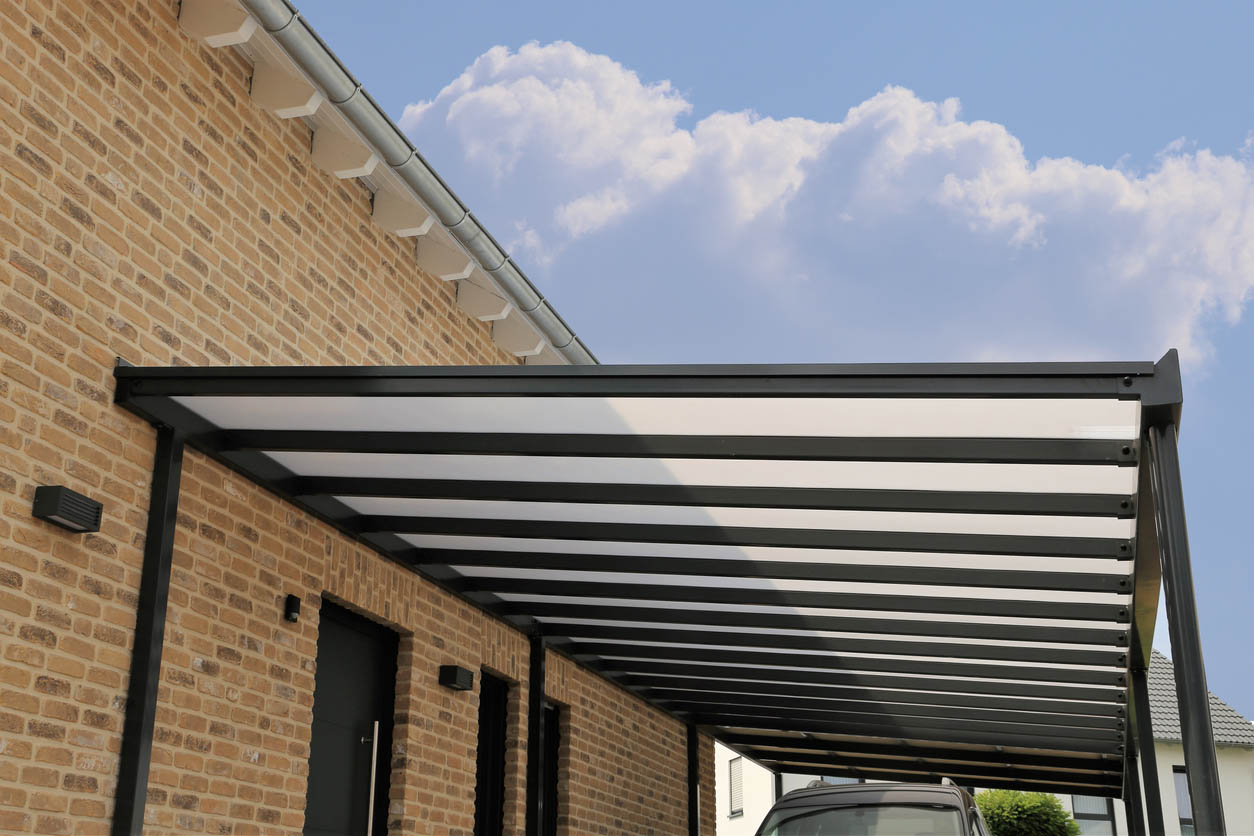
Additional Costs and Considerations
In addition to the carport cost factors detailed above, there are some others that apply in certain situations. Whether or not a homeowner chooses to install a foundation, lighting, gutters, solar panels, or other customizations will also affect the overall price.
Prefabricated vs. Custom-Made
Carports can be prefabricated or custom-made. A prefab carport is already built or comes in a kit with all the pieces required to build the complete structure. This type of carport costs anywhere from $2,000 to $7,000, with an average cost of $4,500. With a prefab carport, buyers are limited to the sizes and styles available.
A custom-made carport offers homeowners made-to-order sizing and material options. The price is higher at $4,000 to $12,000, or $8,000 on average, but there is a lot more flexibility for homeowners to build the perfect carport solution for their vehicles. The best carports that last the longest and look the most attractive are almost always custom made.
Foundation Installation
Many carports are built on top of a concrete foundation slab. These slabs cost $4 to $8 per square foot. The foundation may also require piers for adequate support of a vehicle. A 12-foot by 20-foot concrete slab with piers fit for a one-car carport costs at least $1,500. A concrete foundation gives a carport a slightly more finished feel and makes it easier to convert the carport to a garage in the future.
Painting
There are a number of reasons homeowners end up painting their completed carport. One reason is to blend the carport in with the color of the home by matching the paint. Additionally, a coat or two of paint provides an added layer of protection for the carport framing against wind and rain. Having a carport painted costs from $300 to $2,000. This assumes a painter charges $25 to $35 per hour and needs 12 to 20 hours to complete all of the painting required.
Solar Panel Installation
The roof on a carport is often the perfect location to install solar panels. This is especially true if the angle of the roof is designed specifically for solar panel installation, maximizing the solar energy captured. Installing solar panels on a carport’s roof is not cheap—the average cost of a solar carport is around $60,000—so homeowners will want to do a cost-benefit analysis to determine whether the potential energy savings are worth the cost. Depending on how much the homeowner will save on energy bills from capturing solar energy, the panels can eventually pay for themselves. A two-car carport is usually the size needed to meet a home’s electricity needs.
Gutter Installation
Managing the rainwater around a home is always a smart choice. Rainwater that is not properly managed can seep into foundations and quickly cause water damage. For this reason, homeowners will want to install gutters on a carport if it is attached to the main home or close to a foundation structure. Gutters cost anywhere from $3 to $30 per linear foot; the cost is well worth the peace of mind for the water control.
Lighting Installation
Navigating a carport at night is much easier with outdoor lights. If the carport is located near an existing exterior light, this might not be a necessary expense, but additional exterior lighting can never hurt. On average, outdoor lighting costs anywhere from $2,000 to $4,000. Homeowners may want to include lighting installation in the initial carport building plans to get the best pricing available. An overhead light is typically installed on the front of a carport to illuminate the driveway as well as a light or two inside the structure to navigate in and out of their cars.
Types of Carports
Carports can be categorized as either prefabricated or custom-made. They can also be made from different material types, like metal, wood, and polycarbonate. This section breaks down the differences between each carport type.
Prefabricated
Prefab carports are either already assembled and delivered as is or come in a kit ready for assembly. Prefabricated carports cost between $2,000 and $7,000, or $4,500 on average, and come in a variety of sizes, from small single-car units to large multicar units to those sized for RVs and boats. Most often, prefab carports are made of metal, but they can be wood on occasion. When pricing this project, homeowners who are not the handy types may want to consider the additional cost of a builder or handyman to assemble the carport kit. Because prefab carports are shipped directly to a residence, it is possible to find secondhand, used carports for sale, ready for the next owner.
Custom-Made
Custom-made carports cost more than prefab ones, with an average price of $8,000 and a range of $4,000 to $12,000. To install a custom carport, a homeowner will hire a carpenter or contractor to build the entire structure from the ground up. The benefit of a custom carport is that it can be built to the exact dimensions best suited for the homeowner’s vehicles and property. The entire process will involve prepping the site, pouring a concrete slab, and erecting the carport. Homeowners will want to be sure to account for the site prep and concrete slab cost in their pricing estimate. They may also need to hire an electrician to wire lights or outlets for the carport.
Metal
Metal carports cost between $10 and $30 per square foot with an average cost of $20 per square foot. A metal carport can be either prefab or custom made. The framing is the main metal component and is either aluminum, steel, composite, or a metal alloy. The covering can also be made of metal or is sometimes polycarbonate or fabric. Metal carports can be attached to the main home structure or freestanding and portable.
Polycarbonate
A polycarbonate carport costs $12 to $20 per square foot or $16 per square foot on average. The most affordable carport option, polycarbonate carports are usually made with aluminum framing and polycarbonate covering. The cover is substantially thick and offers some weather protection and filters out harmful UV rays. The structure can be attached to another building or installed to be freestanding. Polycarbonate carports are most often part of a kit aimed at DIYers.
Wood
Wood is most often used for custom carports. Homeowners can expect to pay between $15 and $30 per square foot or $22.50 per square foot on average for a wood carport. Wood carports tend to have more of a finished look, with complete walls on the sides and sometimes the back. The covering can also take on more of a roof look, being made from shingles or metal roofing. The inclusion of these higher-quality building materials is what leads to the higher cost of a wood carport.
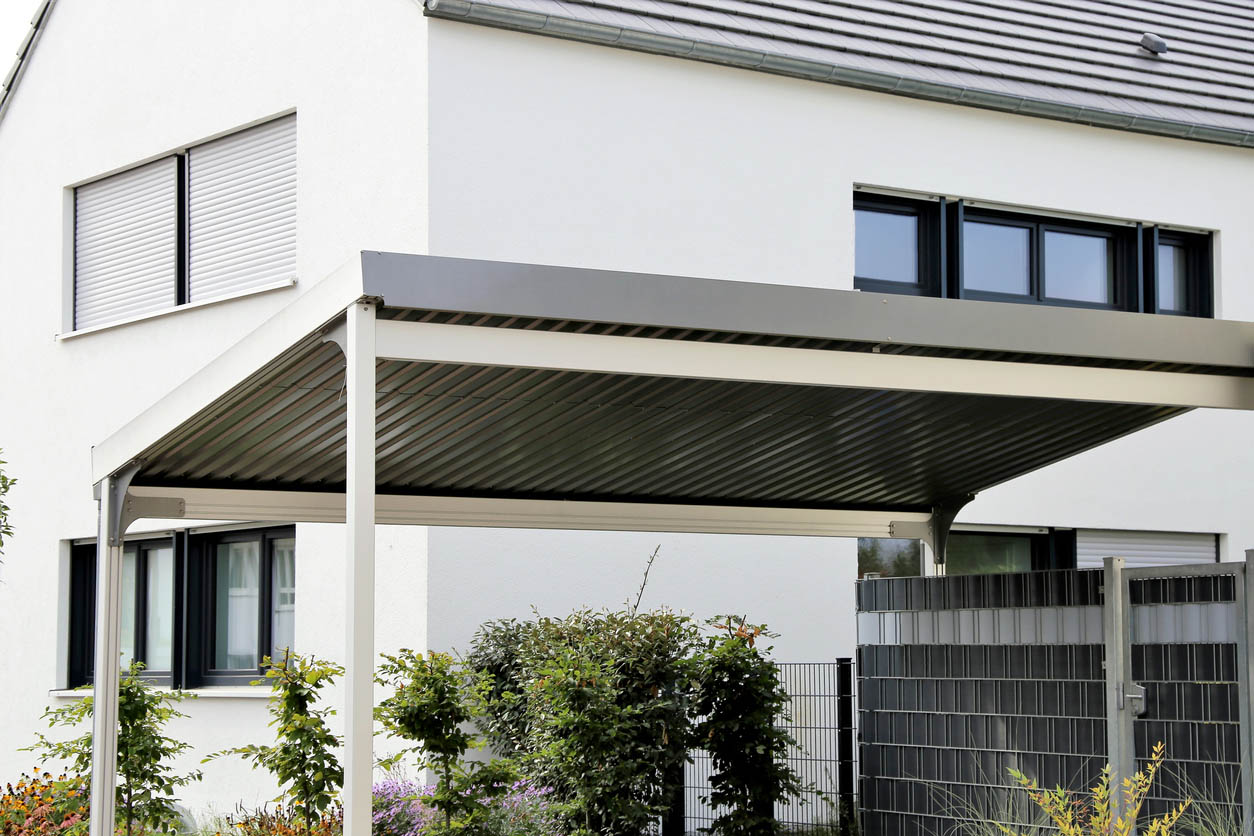
Benefits of Building a Carport
Carports provide plenty of benefits besides the most obvious one: providing shelter for cars and other vehicles. A carport serves as excellent weather protection and can take on many more functions.
Protection from the Elements
A carport will provide shade from the sun, coverage from the rain, and protection from lighting. While a garage may provide slightly better protection because of the enclosed walls, a carport still offers adequate coverage in most weather scenarios. In torrential rain and snowstorms, homeowners may experience a little bit of the weather from the open sides of a carport.
Additional Recreational Space
Carports aren’t just for cars; there are plenty of unique ways to use a carport. The area beneath a carport can be used as an extension of a patio or recreational space for games with friends and family. In warm climates, the shade a carport offers is extremely valuable, making outdoor play in the summer a possibility.
Cost-Effective Installation
When compared to the cost of a garage, the cost of a carport is much more cost-effective. There are far fewer materials needed and often no utilities, hence the less expensive price point. There are also carport options for all budgets, from cheaper, freestanding carports to more expensive custom options. To save even further, homeowners can opt for the most affordable carport kit or find a used carport for sale.
Versatile Storage
A carport can also be used as protection for long-term storage. Whether homeowners want to stow away lawn-care items in the winter or protect patio furniture in the summer, a carport offers a versatile storage solution. Using a carport as a multifunctional storage area is especially useful for homeowners who are limited in storage space; they’ll just want to be sure to design the carport with enough room for their cars and storage items. Homeowners may also consider hiring one of the best garage organization companies to professionally organize their carport storage.
Carport Installation: DIY vs. Hiring a Professional
The only type of carport fit for a DIY installation is a small carport from a DIY kit. These kits usually come with step-by-step instructions and all of the parts and pieces necessary to construct the carport. Even with these kits, however, homeowners will need to have the proper tools to fasten the pieces together and the know-how to safely and securely build the structure.
For larger carports, custom carports, and carports for those without handy skills, it is often best for homeowners to hire a professional to build the structure. An improperly installed carport is at risk of becoming damaged in a storm or even causing damage to a car if something like a tree branch breaks and falls.
A professional builder or contractor will know all the necessary steps for installing a carport. They will ask the homeowner the appropriate questions to ensure the homeowner is getting the exact size and style of carport they want. The builder will also know how to properly prep the site, pour the foundation, and build the carport from start to finish.
How to Save Money on Carport Cost
Building a carport can put a significant dent in a homeowner’s wallet. Incorporating these money-saving tips can help homeowners keep more of their money throughout the process and plan ahead for savings in the future.
- Request pricing from multiple contractors. Always get pricing quotes from at least three different companies before beginning a carport installation project. This way you can compare the cost of services and choose the best value option. The best value is not always the cheapest option but instead the contractor who provides the best overall service.
- Limit your carport size. While it might be tempting to build a larger carport that fits all of your cars and then some, size is a significant factor in the overall cost. Speak with your contractor and choose a size that is a compromise between the size you want and the size you actually need.
- Contact your homeowners insurance company. You will want to alert your homeowners insurance company that you have installed a carport to ensure the structure is covered. Since garages are typically covered by insurance, carports have a good chance of being covered as well. If your carport suffers damage from a natural disaster, you can get money for your repair from the insurance company as long as it is covered.
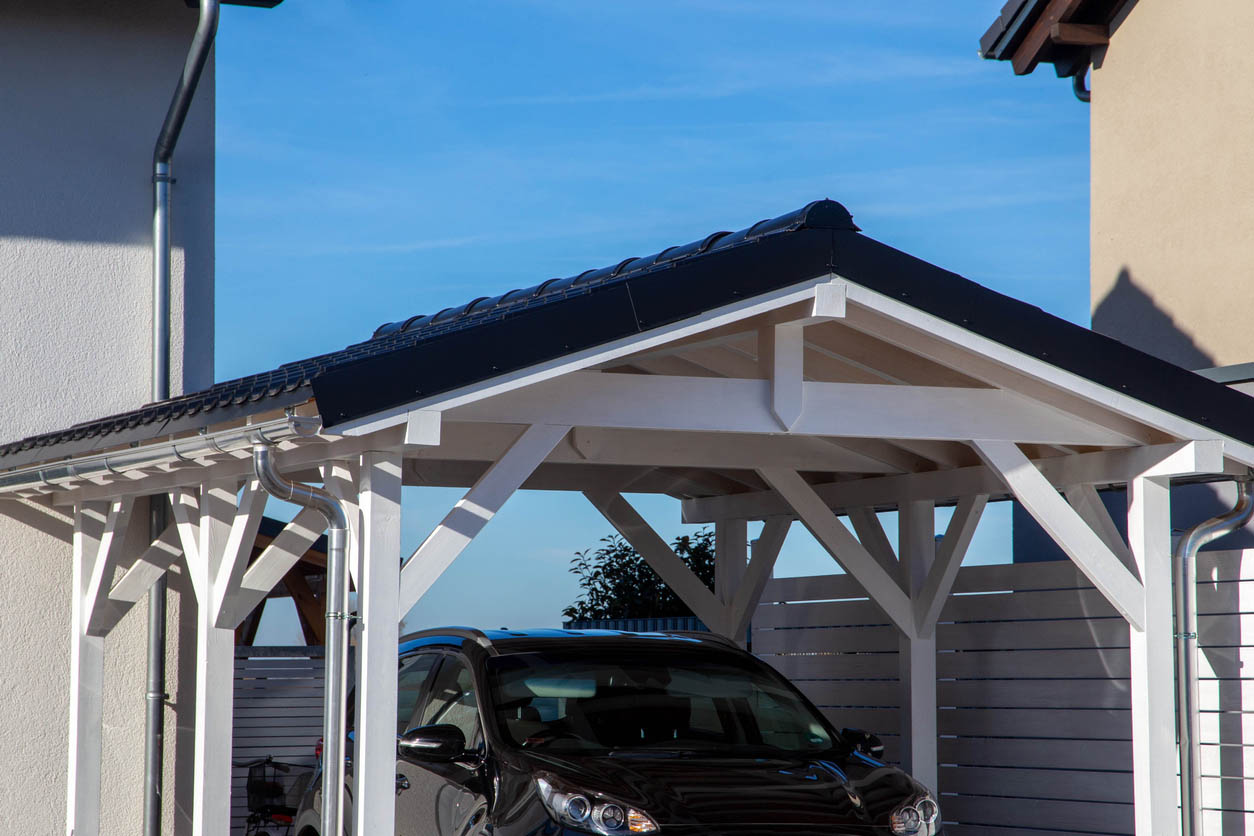
Questions to Ask About Carport Installation
There are likely plenty of qualified builders in the homeowner’s area capable of constructing a carport. Homeowners can use these questions to properly vet each one and feel confident that they have chosen the right one for the job.
- Are you licensed and insured to perform this type of work?
- Will you provide a written quote and contract?
- Do you offer free estimates?
- How long have you been in business?
- Will the work be completed by an employee of your company or a subcontractor?
- Can you provide references from similar projects?
- What type of carport materials do you recommend?
- Do you recommend attaching the carport to my house or installing a freestanding carport?
- Should the carport have a concrete foundation?
- How soon can you schedule the work?
- How long will the project take?
- Do you require a down payment, and if so, how much?
- What is the payment schedule, and do you offer payment plans?
- Do you offer a warranty on your work?
- Will you take care of the cleanup after the project is complete?
- How do you handle disputes or disagreements?
FAQs
Carports can be a nuanced topic with lots to know. Homeowners may want to read through these frequently asked questions to become fully knowledgeable on the topic.
Q. What are the benefits of a carport?
The benefits of a carport include the following:
- protection from weather and theft;
- additional space for storage or recreation;
- customization options;
- easy to enter and exit;
- added value to a home;
- improved storage organization.
Q. Do carports work in winter?
Carports do work in the winter; they are designed to protect a car from extreme weather, including the snow, wind, and hail. While a carport does not provide as much protection as a garage, it is still a much better alternative to keeping a car out in the open during the winter.
Q. Do carports protect cars?
Carports do a great job of shielding cars from rain, hail, wind, and snow, and they also provide protection for passengers entering and exiting their vehicles. Additionally, carports can reduce the risk of car vandalism and theft. A criminal is less likely to approach a vehicle that is covered by a carport.
Q. What is the standard height of a carport?
The standard height of a carport is 12 feet. This provides enough clearance for standard vehicles. If an RV, boat, or another type of recreational vehicle will be stored in a carport, the height will need to be adjusted accordingly.
Q. How do I choose a carport?
Homeowners will want to choose a carport that is the right size for their cars and anything else they want to store underneath. Overall, homeowners will want to consider the type and height of their vehicles, the number of vehicles they plan to store, and the size of any additional storage items, like lawn equipment and patio furniture.
Q. How is a carport measured?
A carport is measured using this standard:
- width: outside to outside horizontal distance between the base rails;
- height: vertical distance of the support posts plus one foot;
- length: horizontal distance from front leg to back leg.
Sources: HomeAdvisor, Fixr

